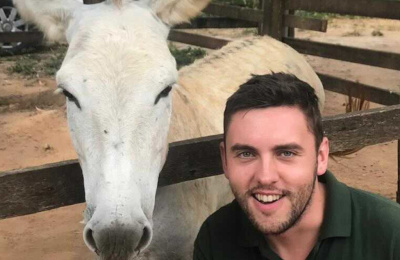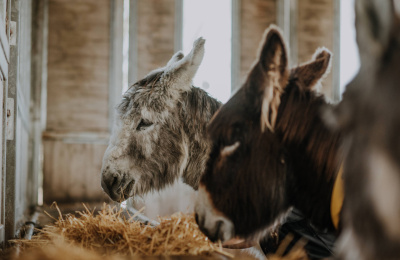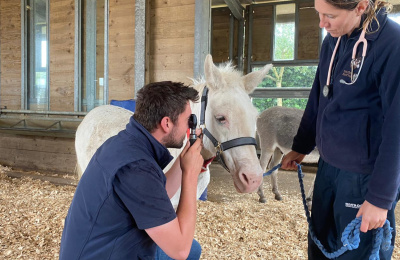It may be tempting to offer a donkey or horse a little treat when you pass them. However, you may cause some serious health complications. We caught up with Veterinary Surgeon Jamie Forrest to find out more.
With the summer holiday season here and the recent warm weather, many of us enjoy getting out and about in the countryside and going for walks and picnics.
The main visitor centre at our Sidmouth sanctuary and many other farms across the country are along public footpaths where people can enjoy getting close to donkeys and other equines.
It is, however, essential to not feed our donkeys or other people's horses and ponies. Treats suitable for some equines may have catastrophic consequences for others.
Our donkeys are fed specialist diets individually tailored to their needs and designed to keep them in the best shape. Extra feeds or feeding unsuitable items can lead to weight gain and obesity, and some severe emergency issues.
Jamie Forrest, our Veterinary Surgeon, explains: "It is so important not to feed other people's horses and donkeys without getting their owner's permission. There are many different reasons why feeding other peoples horses and donkeys is a bad idea. Inappropriate feeding can lead to serious issues such as laminitis, colic, choke and even poisoning."
Laminitis
Laminitis is a common yet serious condition affecting a donkey or horse's feet, which can be fatal if left untreated or not managed quickly and appropriately. Laminitis can be linked to insulin production and the high sugar content of certain feeds. Lush grass and sweet treats such as fruits and carrots are high in sugar and can trigger laminitis.
"While out and about, you may see horses or donkeys without any access to grass, even though their companions might have plenty. This may be due to a history of laminitis, and their owners are managing their sugar intake. You may also see some equines wearing 'grazing muzzles' to limit their grass intake. Picking grass and feeding it to these animals could have grave consequences and unintentionally lead to pain and suffering," explains Jamie.
Colic
Colic is a condition in donkeys and horses which presents as abdominal pain. While some colic cases are only mild gut discomfort, others are far more serious and can quickly become fatal, requiring emergency surgery. Feeding inappropriate foods to donkeys and horses can unbalance their gut microbiome and cause impactions or twists in the gut, requiring veterinary intervention.
Jamie explains: "Donkeys especially are curious animals and will often eat inappropriate food if offered. It is also essential to take home your litter if you have a picnic in an animal field as human rubbish can lead to severe colic if ingested."
Choke
Another potentially life-threatening issue caused by inappropriate feeding a donkey or horse inappropriately is choke. Choke is an obstruction of the oesophagus (whereas choke in humans refers to a block of the trachea).
Choke is commonly caused by equines not chewing their food properly – which is often due to anatomical reasons such as dental problems, lack of teeth or abnormal oesophagus anatomy. Anything can cause a choke – with carrots being one of the most common causes.
Elaborating further, Jamie says: "Many of our donkeys are on special diets because of dental issues and eating something inappropriate could easily cause a choke episode. If an owner is unaware that their donkey or horse has eaten something that may cause choke, they may unintentionally delay treatment, and the risk of a more serious complication such as aspiration pneumonia could increase."
Poisoning
While donkeys and horses enjoy many wild and natural plants as treats – some are highly poisonous and should never be fed to them. Plants such as ragwort, bracken, yew, sycamore and red maple are toxic to equine species.
Jamie says: "It is very important never to pick and feed any wild plants to animals that are not growing in their field."






